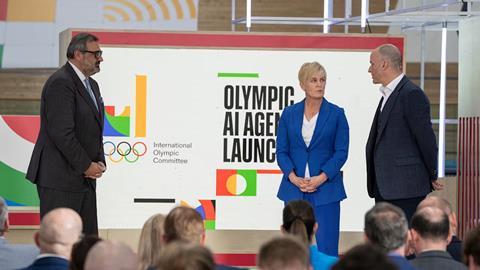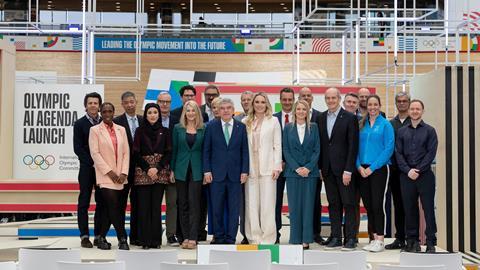Trio were speaking at the IOC’s AI Agenda event on 19 April

The Olympic Broadcasting Services, Warner Bros. Discovery, and NBC have revealed the various AI-powered technologies that will be used to broadcast the Paris 2024 Olympic Games this summer.
The trio, represented by OBS CEO Yiannis Exarchos, WBD president and managing director for the UK & Ireland plus Sports Europe, and NBC Olympics Production executive producer and president Molly Solomon, were speaking at the IOC’s Olympic AI Agenda event, which took place at the Lee Valley VeloPark, Stratford, on 19 April. You can watch the full two hour event below.
Exarchos, who revealed that the OBS has been working with AI tools since 2018, noted that, “We are working together with our partners, Intel, and for the first time, in Paris, we will put at our broadcasters’ disposal a platform where they can generate very fast, very customisable highlights that can be [customised] by country, by sport, and so on.”
Georgiou believes this could go further, and predicted, “I can imagine a world where eventually we get to a place where [you can] join a football match half way through and you say to your device, ‘just show me the goals and the key moments from the first half,’ and within seconds you’ll have an automatically generated highlights package with voiceover.”
He added, “If that sounds a bit fanciful, it’s not, because we are already using technology in our editorial workflows where we are creating base cuts of editorial highlights that can be used, eventually, to generate that kind of opportunity.”
Solomon revealed, “We are going to be using the automated highlights that OBS is offering in Paris. We’re also very much looking at personalisation and customisation for fans. Imagine coming to the platform, saying what you want to see, and it immediately popping up.”
She added, “So much right now is just manual tagging of gold medals, world records, emotions, but we really think that the video production process can be enriched further using these AI tools. This is going to give us specialised footage that we can use very quickly and customised offerings for our viewers as well.”

Georgiou mentioned that another area that could see AI use is dubbing and translations for commentary that would not otherwise exist, “One of our biggest challenges is customising lanaguage, because it’s 3800 hours of live competition. We’re in 47 different markets, in 19 different languages, and at any one time we can have 30 events happening simultaneously.”
He added, “We employ 400 commentators, and even with those 400 commentators we cannot commentate on every hour of the Games. So how do you use technology to enhance translation and further localise that content in areas that you can’t logistically do, can’t afford to do? How do you augment the commentators into other territories?”
Exarchos named archive as another area that could be affected. The IOC is already working with Alibaba to colourise and tag its archives, and he said, “For us, this is a major project. Moving forward, it’s very important because we believe it will make the Olympic legacy more accessible to an even greater audience all year round.”
While discussing these changes, all three spoke of their belief that humans will remain important to the production process. Solomon said, “Everything we saw today gets me so excited about all of these AI tools. It can enrich our presentation…but that must be balanced with human oversight.
“We need to protect intellectual property rights. We need to protect against bias, and also protect jobs. So we need to continue to value human expertise and ingenuity, and ethical leadership as we go forward.”
Georgiou agreed and added, “We don’t believe that AI can replace the creative process. It’s a tool that can help the creative process, and inspire the creative process, but not replace it. The obligation for us as a company, and as an industry, is how do we reskill people?”
Exarchos concluded, “For me, the opportunity with AI is not to displace jobs. Actually, it is to offer people more opportunities to do more interesting things… As has happened with other big changes in technology, usually it is proven that it doesn’t actually displace jobs, it actually brings the requirement for new talents.”
Images: IOC/Greg Martin





No comments yet